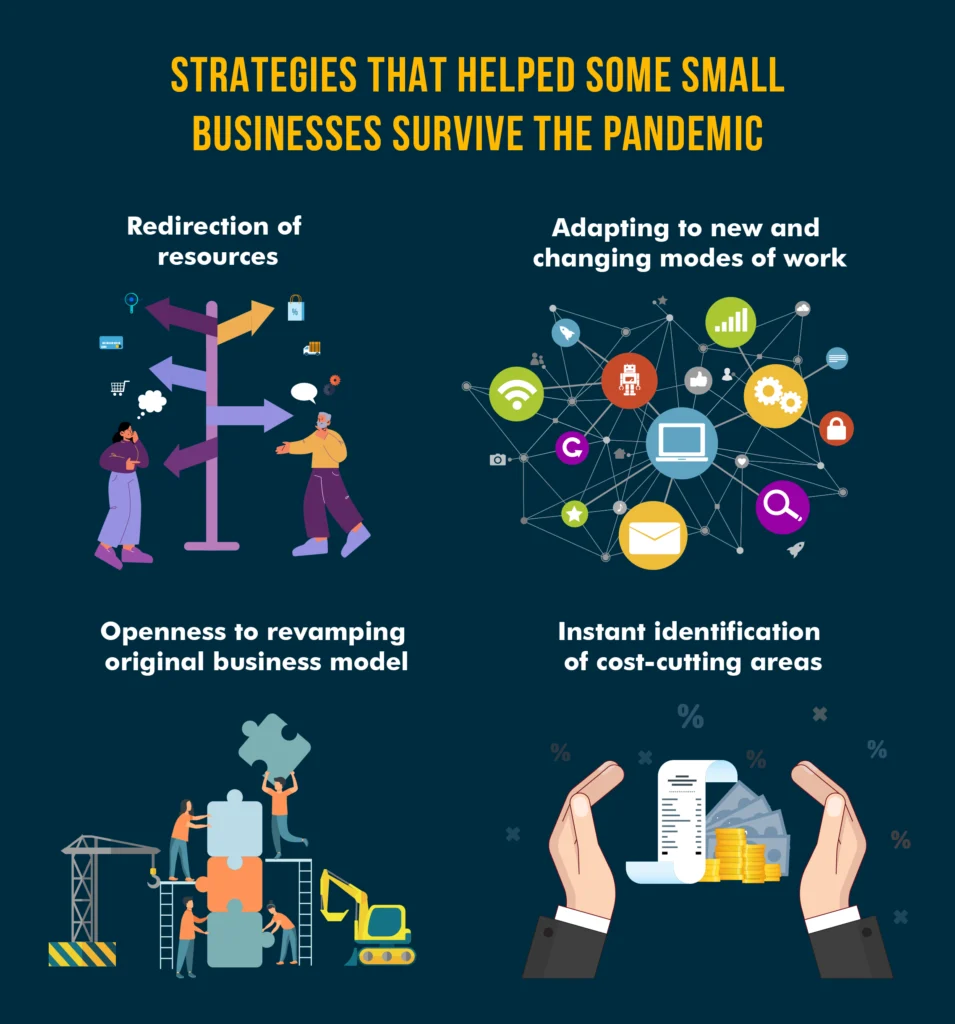
It’s been a while since we’ve loosened our grip of caution concerning COVID. Our immunities are slowly strengthening. What was once life-threatening is now a mild bump on the road. But is that how businesses also view the pandemic? How many were immune to the economic breakdown that 2020 wreaked on them? How many pulled through successfully? The corporate world reported its own set of survivors and casualties regarding businesses. Read on to discover more about the pandemic business world: which industries succumbed to the pandemic, which stayed secure, and what set the two apart.
The survivors
Whether you’ve heard it from Kelly Clarkson or Friedrich Nietzsche: “What doesn’t kill you makes you stronger” is an aphorism that is true for individuals and businesses alike. While dealing with the onslaught of the coronavirus, many businesses launched counterattacks by drastically changing their functioning model. So what exactly did these troopers manage to do?
For starters, the work-from-home (WFH) model, which was initially criticised, proved to be a blessing for most companies. Even as we tread carefully back to “normalcy” in these post-pandemic times, many businesses stick with WFH. In some cases, companies prefer hybrid models keeping in mind the problem of burnout that a strict WFH model poses. The most significant advantage of this move was that businesses could now eliminate many of the assumed fixed costs. For example, expenses like rent for office space, power bills required to run a workplace, and other employee benefits like pick-ups, drop-offs, catering services/canteens etc., were no longer in the picture. This filled up the profit coffers considerably.
Moreover, there was another advantage to the remote work mode. In the pandemic business world, companies could now recruit from across the globe. A culturally diverse team of workers always adds fresh energy and ideas. Taking all of that into account, we can safely say these companies are more than just survivors. Besides the Amazons and the Apples of the world, several others also managed to feed their kitties. Netflix offered endless binges when the outdoors were off-limits. Zoom Video, the enabler of WFH, reached 300 million daily users by April 2020. Other businesses that prospered through these trying times were the ones that filled the pandemic-induced gap in logistics. We are talking of course, about the food and grocery delivery services and big pharma companies.
Pandemic babies
Ruthless as it has been, the pandemic business world spawned many new businesses. While many of these pandemic babies were an invention born out of necessity, many others fall into the category of alternative enterprises. As soon as COVID testing centres were identified as the need of the hour, they cropped up in big numbers. Many existing shop-owners, either converted to a testing facility or provisioned for testing.
Meanwhile, thanks to the lockdown’s pervasive boredom, there was also a notable spike in the influencer marketing industry. The sudden upsurge in viewership meant that influencers had struck gold. Social media became the antidote to weariness, and influencers administered it in vat-sized quantities.
Then came the medical teleconsultation services and cloud kitchens, as in the cases of the UAE’s Alma Health and Kaykroo respectively, which announced their clear intention of new business beginnings. Other entertainment, edutainment, and infotainment-focused businesses also entered the pandemic market. Whether gaming, online tutoring, remote fitness sessions, online hobby classes, or home improvement—the need to push out the boredom and the need to make an extra buck created fertile grounds for these businesses. However, the jury is still out on whether these tenacious ventures will last.
Grave businesses
No pun intended! Murky as this label is, it was a sorry reality for many setups. During the pandemic, many businesses could not survive the hit to their turnovers.
Small and medium enterprises in particular could not stay afloat despite the widespread retrenchments. The two years of persistent disuse due to COVID also inevitably made many sectors obsolete. Malls lay desolate. The tourism industry halted; needless to say, several travel and tourism companies had to shut shop. Even cab service behemoths like Careem (owned by Uber now) suffered substantially and had to lay off 31% of their workforce by May 2020.
The Dubai Chamber of Commerce’s survey in mid-2020 reported that a staggering 70% of businesses in Dubai would have to close their doors by the end of the year. Of this, 74% were in travel and tourism and about 30% in transport, storage, and communications.
However, in the words of Gwendolyn Brooks, made famous by Kanye West’s chart-topping track, “even if you are not ready for the day, it cannot always be night.” Despite the hit that the economy suffered, a surprising number of businesses in the hospitality sector have bounced back! A 2021 report published in Palarch’s Journal of Archaeology of Egypt/Egyptology noted that the UAE was well-positioned to make a post-pandemic boom thanks to country-wide initiatives. And sure enough, Dubai’s hospitality industry has been revelling as estimated. By late 2021, hotel occupancy in Dubai exceeded 90% in mid-November, as reported by data firm Smith Travel Research (STR). Moreover, traffic during the first week of December surpassed even the 2019 levels, according to navigation company TomTom. Now that’s one way to ‘brave the grave’!
COVID capitalists
Thanks to the nightmarish outbreak, medicine and drug hoarding have become a real problem. Never considered important or flashy enough to be knights in shining armours, the big pharma lads indeed milked the pandemic for all its worth. Not just due to the weighty funds they suddenly became eligible for, but also due to the paranoia around medical supplies and the vaccine rush, the Pfizers, Modernas, and BioNTechs made bank during the pandemic. They have both market monopoly and vaccine privatisation to thank for this. Moderna’s share price gained more than 700% since February 2020, while BioNTech surged 600%. CanSino Biologics’ stock was up about 440% over the same period.
Whether or not this leaves a bad taste in one’s mouth is a conversation for another time. But, from a profit-maximising perspective, these COVID capitalists managed to win big in the pandemic business world!

After the shuffle
The pandemic overhauled markets and ushered in brand new tricks of the trade—as well as brand new trades! In doing so, it has changed the face of business as we know it. What was once possible only in person can now be done with the help of the internet. Businesses now welcome novel ways of working due to their greater reliance on virtuality and the Internet of Things. The concept of a workation (work-vacations), where employees can enjoy a change in location and work from there, is already gaining popularity.
The markets are still recovering. Yet many micro and small establishments and enterprises with their trendy, global workforces and labour-friendly work ethics are already setting the scene for the future. Bigger businesses, too, anxious to not miss the train, are beginning to make a few much-needed changes to their inner workings. While the profit motive remains unwavering, the fact that former fixed costs are now variable costs is making many market bigwigs amenable to these baby steps.
As the world adjusts to existing virtually, will the COVID-born businesses make it? Are they sustainable enough? Well, we’ll have to wait and see.


